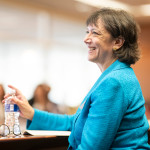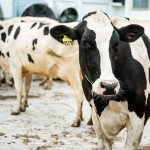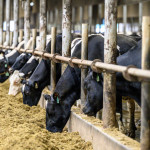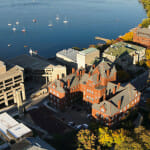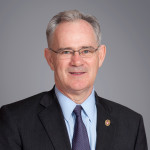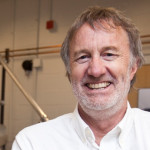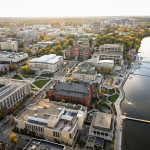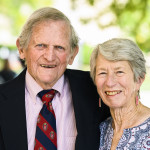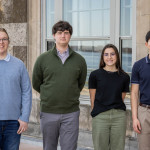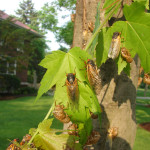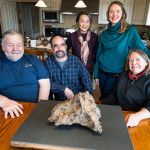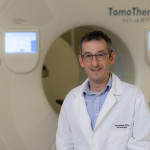Category For media
Watery planets orbiting dead stars may be good candidates for studying life — if they can survive long enough
The small footprint and dim light of white dwarfs, remnants of stars that have burned through their fuel, may make excellent backdrops for studying planets with enough water to harbor life.
Wind from black holes may influence development of surrounding galaxies
The discovery helps illuminate the way active black holes can continuously shape their galaxies by spurring on or snuffing out the development of new stars.
Small, cool and sulfurous exoplanet may help write recipe for planetary formation
UW–Madison astronomers and their collaborators hope the discovery of one exoplanet's sulfurous atmosphere will advance our understanding of how planets forms.
NIH director’s visit to UW–Madison highlights biomedical research, future opportunities
The daylong visit highlighted the university’s innovative work in areas such as theranostics and precision medicine, and Director Monica Bertagnolli heard how UW–Madison researchers are combining data-driven diagnostics and innovative technologies to develop highly targeted cancer treatments.
UW–Madison engineers mark 3D printing milestone in race to in-space manufacturing
Researchers at the University of Wisconsin–Madison have taken a step toward in-space manufacturing of replacement electronic components by successfully 3D printing RAM device units in zero gravity for the first time.
A hub for community connection in South Madison
“UWSMP is more than just a building—it's a space that breaks down barriers and sparks collaboration,” notes Brenda González, director of community relations at UW–Madison. “We are a resource for South Madison and our partners, and our team is delighted to welcome community members into the space every day.”
Mother’s Day is Sunday: UW–Madison experts available
Experts from UW–Madison are available to discuss the state of motherhood, questions of gender balance within families and what the day means to different people.
Experts available for interviews on H5N1
The avian flu H5N1 has made the jump to mammals, including cattle, and inactive remnants of the virus have been found in grocery store milk. Experts from UW–Madison are available to discuss questions about H5N1 risk to human health, pets and more.
Kyoung-Shin Choi elected to American Academy of Arts & Sciences
Choi has been recognized for her work developing and understanding electrodes and catalysts for applications critical to creating a sustainable future, like sustainable and environmentally benign production of fuels, chemicals, fertilizers and clean water using renewable energy sources, like solar and biomass.
Earth Day experts available from UW–Madison
The 54th Earth Day will be observed on Monday, April 22. Experts from UW–Madison are available on various aspects about the day of observance, including its theme “Planet vs. Plastic,” climate change, human rights, and more.
UW–Madison biochemist wins prestigious forestry prize for discoveries that support sustainable energy and product innovations
UW–Madison biochemistry professor John Ralph has been awarded the forestry industry's top prize, alongside collaborator Wout Boerjan, a professor at Ghent University in Belgium, for their groundbreaking research on the molecular structure of lignin, one of the main components of plant cell walls.
Wisconsin Idea Database reveals UW–Madison’s positive impact across all 72 counties
Latest data show how UW provides educational opportunities, builds the workforce and economy in every county in the state
UW–Madison to name new Computer, Data & Information Sciences building for John and Tashia Morgridge
The building will be the first to bear the name of UW–Madison’s largest benefactors.
Four UW–Madison students awarded prestigious 2024 Goldwater Scholarships
Four University of Wisconsin–Madison students have been named winners of 2024 Goldwater Scholarships, the premier undergraduate scholarship in mathematics, engineering and the natural sciences in the United States.
Cicada experts and resources available from UW–Madison
A historic double brood of cicadas is expected to emerge this spring, with hatchings centered on the Eastern and Midwestern parts of the United States.
Exceptional meteorite, plowed up from a Dane County field, finds new home in UW Geology Museum
The hunk of iron weighs in at nearly 110 pounds, is Wisconsin's 15th classified meteorite, and is the first ever recorded in Dane County.
Jonathan Levine to become dean of UW–Madison School of Veterinary Medicine
At Texas A&M, Levine has served as professor and head of small animal clinical sciences. His time there has given him an in-depth understanding of what it takes to build an impactful research and care program in an academic veterinary school, as well as an appreciation of the importance of fostering an inclusive environment that values diverse perspectives.




